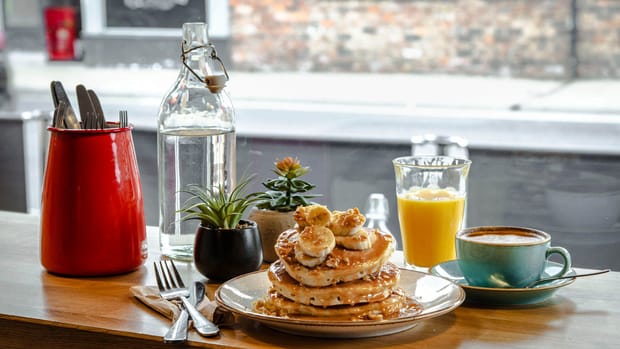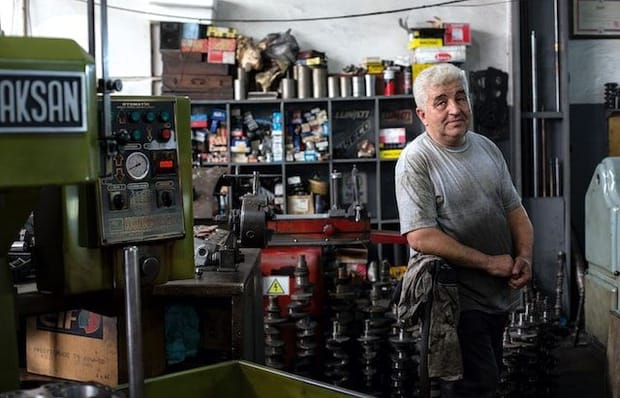Tired of asking the same old interview questions?
Get to know your applicants and test their suitability for a role at your business with these 12 original questions for interviewing front-of-house staff.
1. What are the qualities that make a great waiter / barista / bartender?
Rather than asking your applicant to simply list their achievements or tell you why they think they'd be a good fit for the job, it’s better to focus on the role itself and the skills required to do it.
This question will give your applicant a chance to sell themselves without feeling overly self-conscious, while any subsequent discussion will allow you as the interviewer to hammer home precisely the kind of person you're looking for.
2. Which of these qualities do you lack or could you be better at?
It's important to know where an applicants might need extra mentoring, but the old “What are your weaknesses?” question rarely results in much more than a humble brag about being “a bit of a perfectionist, actually”.
Candidates are much more likely to be open about their weaknesses if asked to point to one of the desirable qualities they’ve already listed and admit that they have room to improve in that particular area.
Focus the conversation on how you can work together to make them a better employee, not on why they might not be good enough to work for you.
3. What are the main roles and responsibilities of this job?
This question is a great way to separate candidates who are applying for a job — any job — from those who are applying because they want to work for you specifically.
It would be unfair to expect interviewees to quote every point on your job description, and ideally they’ll answer in their own words anyway, but a candidate who's done their homework will be able to sum up its responsibilities fairly succinctly.
That is, if your job description was written properly in the first place...
4. What’s your favourite dish/drink? Why?
The food or drink item your interviewee mentions here isn’t particularly important, but pay close attention to the way they describe it.
Does their description sell the dish or drink to you? Is their description purely factual or is it tied to a particular memory, place, or person? Do you get the impression that the candidate is genuinely excited about food and drink by the way they talk about it?
Being able to describe a dish or drink well — to paint a picture in a guest or customer’s mind — is a valuable skill for front-of-house staff to have, and means that upselling will come far more naturally to them.
5. How would you describe [drink/food name] to a customer?
This question is intended to test your candidate’s knowledge of the products they’d be handling or serving at your business, and will give you an indication of the amount of training they’d need if you hired them.
Descriptions of food and drink items should be enticing, but also concise and easy to understand — the kind of response a member of your team would give to help a customer make an informed decision without keeping other guests waiting.
Follow up with a couple more questions that a typical guest or customer might ask, for example, “What’s the difference between a stout and a porter?” or “Is a flat white the same as a latte?” to test their product knowledge further.
Looking for a more comprehensive set of interview questions? Check out 20 Winning Interview Questions to Ask Candidates
6. What are some of the most common food allergens?
Regardless of whether you’ll provide training or require certification in this area, it’s important to stress from the outset that knowledge of allergens is vital for those working around food and drink.
How many can your candidate list without being prompted?
Cheat sheet: Often referred to as the ‘big 8’ the most common food allergens are: eggs, cow’s milk, peanuts, tree nuts (e.g. walnuts, cashews, pistachios), wheat, soy, shellfish, and fish.
7. What’s your biggest pet peeve about customers in our industry?
The answer your interviewee gives here isn’t especially important — what you’re doing is getting them to recall a genuine experience or memory as opposed to giving a pre-rehearsed answer.
Be sure to empathise with whatever answer they give and focus on how the behaviour made them feel before leading into the next question...
8. How do you deal with that behaviour when you see it?
Front-of-house staff are the face of your business, so it’s imperative that they have the skills, and patience, to deal with difficult customers appropriately and be able to deescalate prickly situations.
Ask your candidate to give examples of when they or people they've worked with have done a particularly good job of handling difficult customers and what they learned from the experience.
9. What's the best customer service experience you’ve ever had?
The answer to this question will give you a glimpse of what’s important to the candidate and, by the same token, what you might expect from them if you were to make them a part of your team.
Follow up this question by asking how they might try to deliver a similar kind of experience at your business.
10. Where do you see yourself three years from now?
Recruitment doesn't come cheap. Any training or investment an employer makes in staffing needs to be worthwhile for a business to be sustainable.
It's important, then, that you have an idea of what your prospective employees' work/life plans are in the longer term, not to mention whether they've given much thought to their future.
There's no 'right' answer here — some managers will be searching for staff who want to build careers at their company; others will be perfectly happy taking on staff who know they'll move on before too long. But as an employer, you'll need to know that you're hiring someone who's right fit for your business.
11. Do you have any commitments that would limit the hours you’re available to work?
It’s important to know your candidate’s availability right from the outset. Flexibility is key in the hospitality industry, and most applicants will understand that. But there are some things — childcare commitments, college or university lectures, for example — that can be difficult if not impossible to reschedule.
Be sure to keep a note of any time, dates, or days the applicant mentions here. When the interview is over, compare these commitments against a typical staff rota to see whether you could realistically accommodate them.
12. Can you remember what my favourite dish/drink was?
This last one’s kind of cheeky, but if information retention is important for the role you’re hiring for (for example, taking longer orders or meeting specific booking requirements from guests) then it's always worth asking if your candidate can recall something significant you said towards the beginning of the conversation.
Bear in mind that nerves may get the better of some candidates, making it harder for them to retain information as well as they normally might. If they can remember what you told them, however, then it's a fair indication that they'd be able to take good care of your guests or customers.
13. Bonus question for managers: How much time do you spend planning staff rotas?
RotaCloud users spend an average of 66% less time planning and managing staff rotas — time they can spend training staff and putting smiles on customers' faces instead.
Try our cloud-based staff scheduling and attendance software free for 30 days — with no commitment or payment info required — via the button below.






